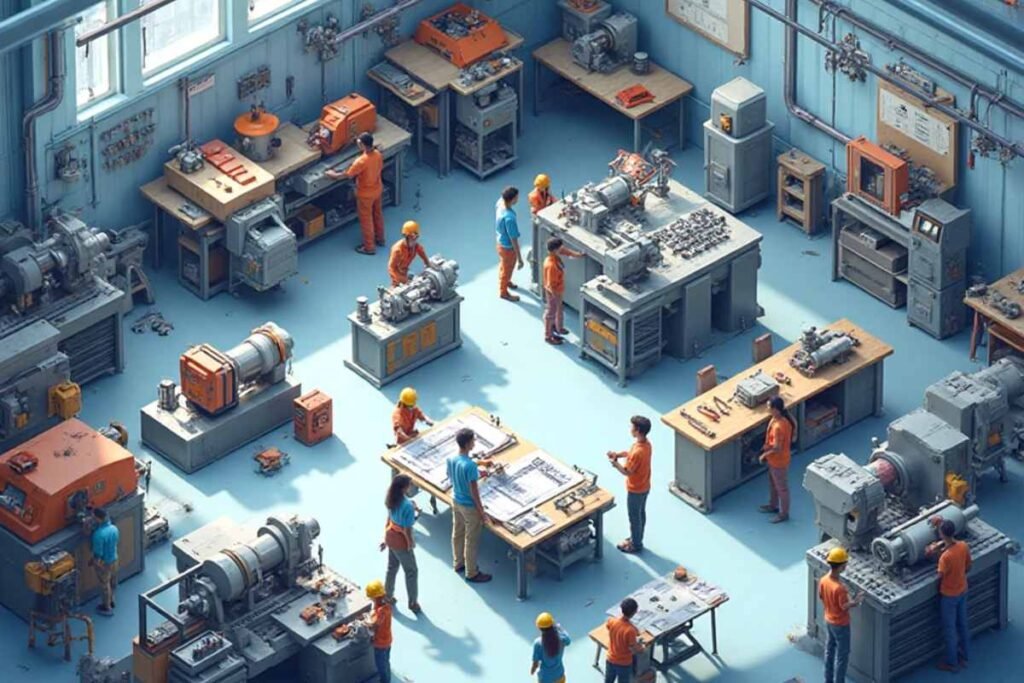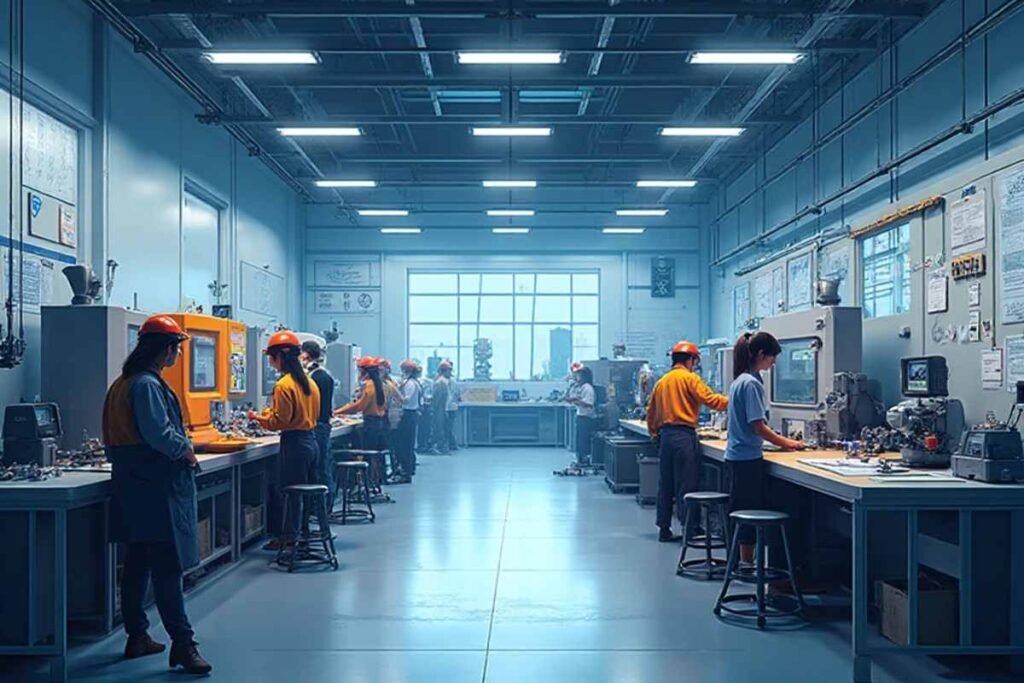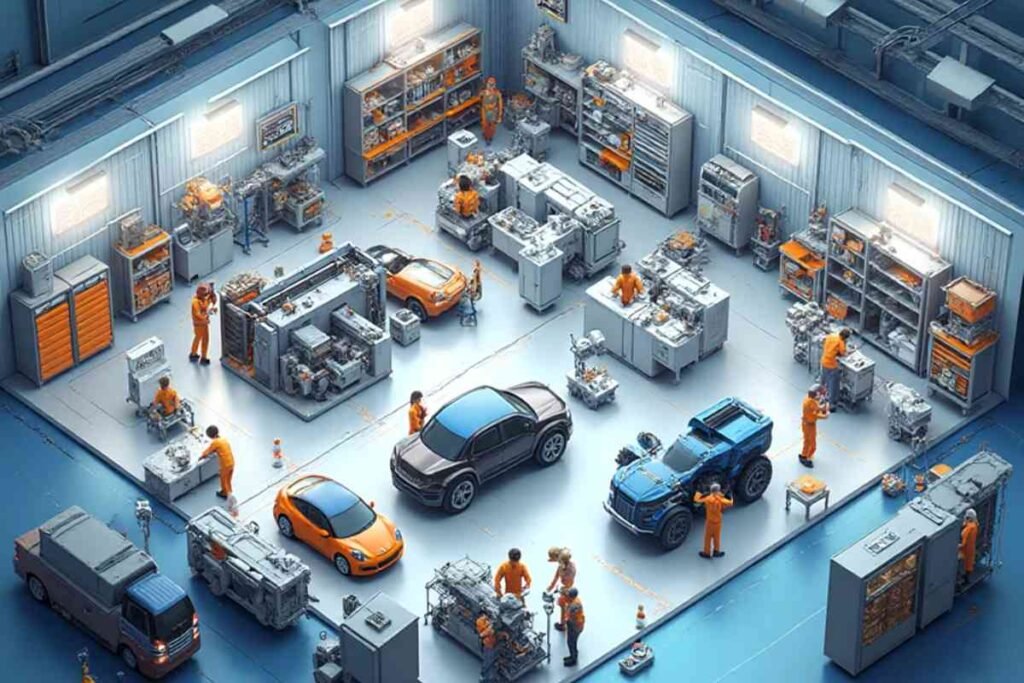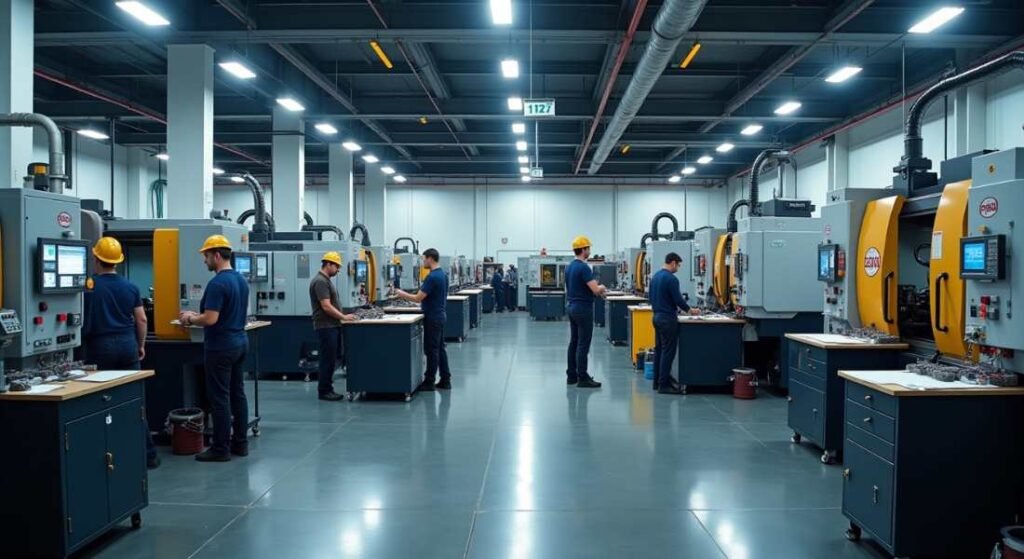A mechanical workshop is a dedicated space equipped with specialized tools machines and safety equipment where mechanical tasks such as welding, drilling fitting repairing and manufacturing are carried out. These workshops are essential for industries educational institutions and research facilities as they provide a controlled environment for innovation and productivity.
In todays competitive engineering world a mechanical workshop plays a vital role in skill development prototyping and precision manufacturing. Whether you are setting up a new facility or upgrading an existing one understanding the basics benefits tools safety measures and advanced technologies used in a workshop is crucial.
What Is a Mechanical Workshop?

A mechanical workshop is a facility where various mechanical operations are performed using specialized tools and machines. It serves as a hub for activities like cutting grinding drilling assembling repairing and designing components. These workshops are common in engineering industries manufacturing units colleges universities and even research laboratories.
Unlike a general workshop a mechanical is equipped with heavy duty machinery such as lathes milling machines CNC systems grinders and welding stations. It also features essential hand tools like wrenches screwdrivers pliers hammers and measuring instruments.
In educational environments mechanical workshops allow students to apply theoretical concepts practically improving their hands on skills and preparing them for real world engineering challenges.
Advanced Technologies in Mechanical Workshops
Modern mechanical workshops are adopting cutting-edge technologies to improve efficiency and precision:
- CNC Machining for automated and accurate production.
- 3D Modeling and CAD Software for advanced design visualization.
- Portable CMM Tools for precise measurements.
- Robotics and Automation to speed up repetitive tasks.
By integrating these technologies workshops can handle complex projects with minimal errors and maximum efficiency.
Core Components and Basic Tools of a Mechanical Workshop?
A successful mechanical workshop relies on the right combination of tools machinery and safety equipment. The exact setup depends on the size purpose and specialization of the workshop but several core components are common across most solutions-digital-transformation/ facilities.
Essential Machines
Mechanical workshops typically include machines designed for precision and durability, such as:
- Lathes used for shaping cylindrical parts.
- Milling machines for cutting and shaping materials with high accuracy.
- Pillar and battery drills essential for making precise holes.
- CNC machines for automated high precision machining.
- Grinders and polishing tools to refine surfaces and edges.
- Welding equipment for joining metals effectively.
Hand Tools
Alongside machines mechanical need hand tools for fitting assembling and repairs, such as:
- Hammers, mallets, and screwdrivers.
- Wrenches, spanners and socket sets.
- Pliers grips and vernier calipers.
- Measuring tapes hex keys and circlip pliers.
A well organized tool storage system like shadow boards or cabinets ensures efficiency and minimizes downtime.
Designing Your Mechanical Workshop: Layout & Safety!
A functional mechanical workshop requires thoughtful design to ensure efficiency safety and productivity. A poorly planned layout can lead to wasted time, workplace hazards, and reduced workflow performance.
Key Layout Considerations
- Space Optimization Arrange machines strategically to minimize clutter and enable smooth material flow.
- Zoning Separate areas for machining welding fitting and assembly.
- Ventilation Ensure proper airflow especially in areas where fumes or heat are generated.
- Storage Solutions Use shelves cabinets and tool racks to keep equipment organized.
Safety Features
- Emergency stop buttons on machines.
- Fire extinguishers and first-aid kits.
- Proper grounding of electrical systems.
- Marked pathways and hazard signs.
A well designed workshop not only improves operational efficiency but also creates a safer environment for everyone.
Benefits of a Mechanical Workshop in 2025?

A well-equipped mechanical workshop offers numerous advantages for students professionals and industries alike. From skill development to innovation these workshops play a vital role in education research and manufacturing.
Enhances Practical Skills
Mechanical workshops provide hands on experience with machines, tools, and equipment. Students and professionals can learn real-world applications, boosting their technical skills and understanding of engineering concepts.
Encourages Innovation and Research
With access to modern tools and advanced technologies workshops create opportunities for innovation. Students and researchers can design prototypes test models and develop creative engineering solutions.
Supports Industrial Growth
Industries rely on mechanical workshops for machine repairs custom parts production and rapid prototyping. This accelerates the manufacturing process and enhances overall efficiency.
Provides Cost Effective Solutions
Instead of outsourcing fabrication and maintenance tasks having an in-house mechanical workshop saves time money and resources by completing jobs internally.
Improves Safety and Awareness
Workshops promote safety training and awareness among users. Through practical sessions staff and students learn about machine safety risk management and accident prevention.
Setting Up Tools & Machinery Step by Step Guide?
Setting up a mechanical workshop can be challenging, but following a structured approach ensures smooth execution
Define Workshop Purpose
The first step is to identify the main purpose of your mechanical workshop. Are you planning it for educational training manufacturing or research based projects? A clear goal helps you choose the right tools, machines, and layout to meet your specific requirements.
Plan Your Budget
Budget planning plays a crucial role in setting up a mechanical workshop. You need to calculate the overall costs including machines hand tools storage systems safety equipment and training programs. A well structured budget helps you avoid overspending and ensures you invest wisely.
Select Suitable Machines and Tools
Choosing the right machines and hand tools is essential for efficiency and accuracy. Select equipment based on the workload required precision and industry standards. High quality tools reduce downtime improve productivity and enhance the overall performance of the workshop.
Install Safety Measures
Safety should be your top priority when setting up a mechanical workshop. Make sure to install machine guards safety switches and protective gear to prevent accidents. Additionally ensure your workspace complies with modern safety regulations to maintain a secure environment.
Train Staff or Students
Proper training is vital for both safety and productivity. Organize regular training sessions to teach staff or students about tool handling machine operation, and safety protocols. Skilled and well trained individuals help maintain efficiency and minimize risks.
Test and Calibrate Equipment
Before starting workshop operations ensure that all machines and tools are tested and calibrated. Accurate calibration improves precision reliability and product quality. Regular maintenance and inspections also help extend the lifespan of your equipment.
Workflow Optimization Tips for Maximum Efficiency
An organized mechanical workshop thrives on smooth workflow management. Streamlining daily tasks can significantly boost productivity:
- Inventory Management: Track tools and materials digitally to prevent shortages.
- Regular Maintenance: Schedule equipment inspections to avoid unexpected downtime.
- Cleanliness Standards: Maintain a clean and clutter free environment.
- Task Prioritization: Plan daily operations based on project urgency and resource availability.
Implementing these workflow strategies helps save time, reduce errors, and maintain consistency in quality.
Safety Protocols: Do’s and Don’ts!
Mechanical workshops involve heavy machinery sharp tools and high temperatures making safety a top priority. Here are some practical safety tips:
Do’s
- Always wear safety gear like helmets, gloves, and goggles.
- Keep the workshop clean and organized.
- Report damaged equipment immediately.
- Follow proper machine operation guidelines.
Don’ts
- Never operate machines without proper training.
- Avoid leaving machines running unattended.
- Do not bypass safety switches or remove guards.
- Refrain from using damaged tools or equipment.
Following these protocols minimizes accidents and promotes a secure working environment.
How to Train Staff or Students in a Mechanical Workshop?
Training is vital for productivity and safety. Workshops should conduct regular sessions on technorozen-resources/.
- Machine handling techniques.
- Safety procedures and emergency response.
- Tool maintenance practices.
- Advanced software training like CAD/CAM systems.
Practical training builds confidence and prepares individuals for real-world challenges.
Common Challenges and How to Overcome Them
Mechanical workshops often face several obstacles that can affect performance:
- Space Constraints: Use vertical storage solutions to maximize limited areas.
- Budget Limitations: Start small and expand gradually as demand grows.
- Skill Gaps: Invest in training programs for staff and students.
- Equipment Maintenance: Schedule preventive maintenance to extend machine life.
Anticipating these challenges and planning ahead ensures long-term success.
Applications of Mechanical Workshops Across Industries

Mechanical workshops are used across a wide range of sectors:
- Education: Colleges and universities use workshops to teach engineering fundamentals.
- Automotive: Car garages rely on workshops for repairs and modifications.
- Manufacturing: Precision tools and machines enable large-scale production.
- Research: Laboratories use workshops to build prototypes and scientific instruments.
These applications demonstrate the versatility and necessity of mechanical workshops worldwide.
Get access to expert tips hidden tricks and effective solutions! Tap the link below to read our full article today!
What Matter Mr Cooper Cybersecurity Incident 2025
Alembic MIS Login 2025 Made Simple & Secure
SDMS px indianoil in edealer_enu Login Guide 2025
Conclusion
Setting up a mechanical workshop in 2025 requires careful planning and attention to detail. From budgeting for machines and tools to installing safety measures and providing proper training, every step plays a vital role in ensuring smooth operations.
By selecting the right equipment training staff or students and regularly testing and calibrating machines you can create a safe efficient and productive workshop environment. Proper preparation today guarantees better performance and long-term success.
FAQs
What is the main purpose of a mechanical workshop?
A mechanical workshop provides a controlled space to perform machining repairing and assembling tasks safely and efficiently.
What are the essential tools in a mechanical workshop?
Key tools include lathes, drills, milling machines wrenches pliers vernier calipers and safety gear.
Can I set up a mechanical workshop at home?
Yes but you’ll need proper ventilation safety measures and compact tools designed for smaller spaces.
How often should machines in a workshop be maintained?
Routine inspections should be done monthly while major servicing should be scheduled at least twice a year.
Is CNC technology essential for modern workshops?
While not mandatory CNC machines significantly improve accuracy speed and efficiency in production.
What safety equipment is mandatory in a mechanical workshop?
Helmets gloves safety goggles steel toe boots fire extinguishers and first aid kits are essential.


